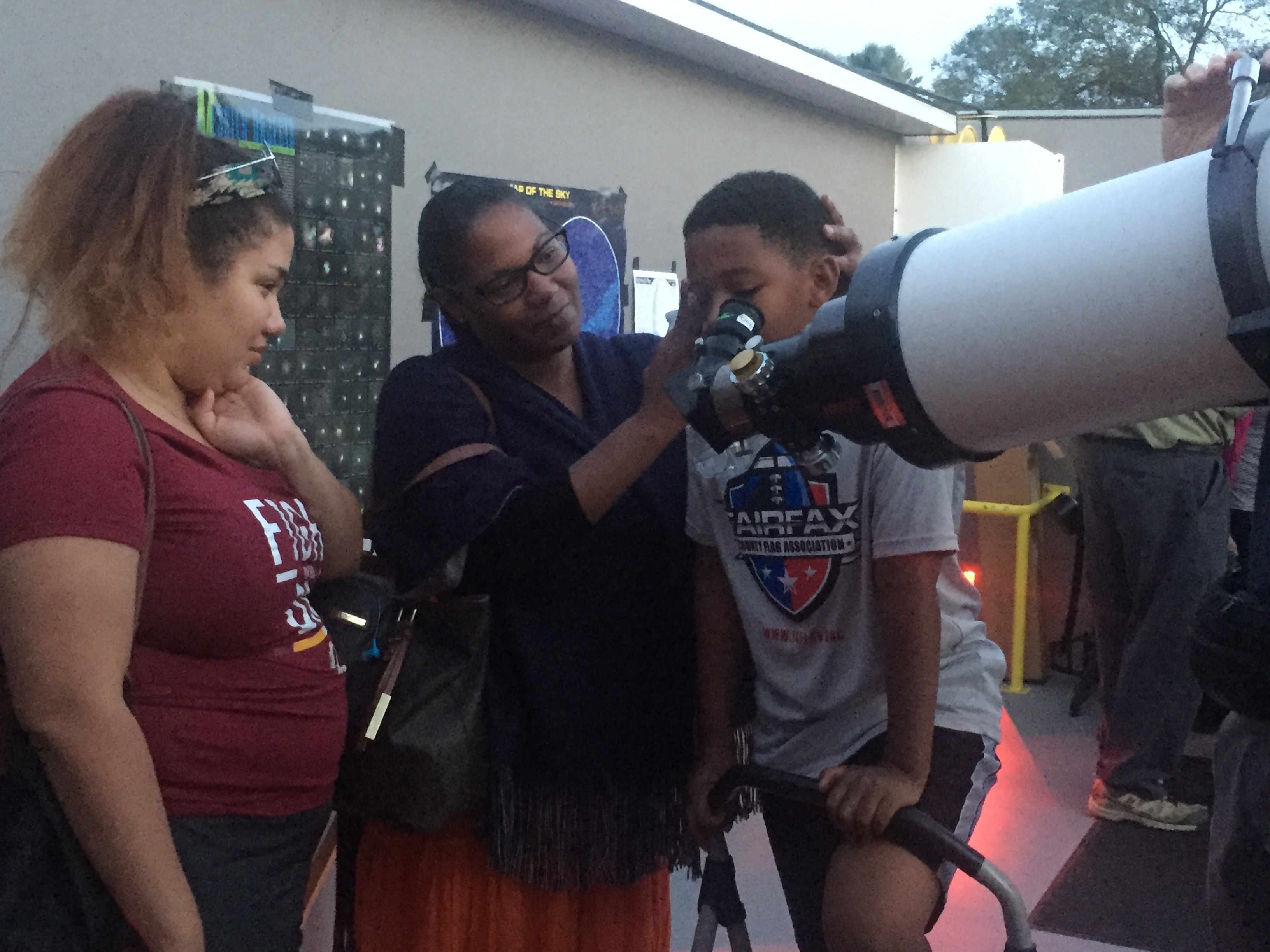Thursday, October 14, 2021
 A family takes turns seeing objects in the night sky through one of the large telescopes at Observatory Park at Turner Farm.
A family takes turns seeing objects in the night sky through one of the large telescopes at Observatory Park at Turner Farm.
At the regular meeting of the Fairfax County Board of Supervisors held Tuesday, Oct. 5, 2021, Foust brought forward a board matter supporting the Park Authority’s nomination of Observatory Park at Turner Farm in Great Falls to be designated as an Urban Night Sky Place. The Board unanimously approved the resolution.
The International Dark-Sky Association makes such determinations.
Light pollution prevents many people from seeing the beauty of the night sky, the Milky Way, lunar eclipses and meteor showers. Artificial light affects the natural world, changing foraging routes and migration for birds, moths and bats, and leading to many deaths. Artificial light affects humans altering their natural circadian rhythms.
Foust said that the International Dark Sky Places [conservation] program offers five types of designations, one of which was Urban Night Sky Places. These are sites near or surrounded by large urban environs whose planning and design promote an authentic nighttime experience. “They do so in the midst of significant artificial light at night,” according to the Association’s website.
Foust said that one of the County’s environmental goals has been to reduce light pollution. Part of the Board’s 2020 Work Program, he added an item to establish lighting provisions to protect dark skies around astronomical facilities.
What Foust referenced was the Public Commission Meeting held on Jan. 15, 2020. In a follow-on motion to Zoning Ordinance Amendment Article 14: Outdoor Lighting and Related Provisions, Countywide. The planning commission recommended that the Board of Supervisors review additional zoning provisions for Park dark skies around astronomical facilities.
“Presently, staff is working on a Zoning Ordinance Amendment for dark skies. Supporting the Park Authority’s nomination demonstrates the County’s ongoing commitment to maintaining natural nighttime light,” said Foust in his Oct. 5 Board Matter.
Observatory Park at Turner Farm features an orientation room used for educational programs and an Observation Room with three telescopes.
According to DarkSky.org, as of August 2021, there were only 180 or so certified International Dark-Sky Places in the world holding one of its five designations. The Certification requires “applicants to demonstrate robust community support for dark-sky protection and document designation-specific program requirements.” The process for Certification as an International Dark-Sky Place reportedly takes one to three years from initial inquiry to the formal designation. The Certification helps “enhance the visibility of designated locations and foster increased tourism and local economic activity,” according to the International Dark Sky Association.
The Great Falls Citizens Association and the Analemma Society submitted letters of support for the Park Authority’s nomination. In an interview with Jennifer Falcone of GFCA, she said that a designation is “totally separate from a zoning amendment.”
The designation of Observatory Park being an urban night sky place will further the objective of protecting the night sky around it, said Falcone. She added that a designation is not a requirement; they are unrelated in that one is not dependent on the other. “It’s more about the education of lighting and how it affects the community,” she said.
“A zoning amendment would place restrictions around the observatory and would become part of the binding Zoning Ordinance of Fairfax County.”
The International Dark Sky Places Program offers five types of designations:
International Dark Sky Communities
Communities are legally organized cities and towns that adopt quality outdoor lighting ordinances and undertake efforts to educate residents about the importance of dark skies.International Dark Sky Parks
Parks are publicly- or privately-owned spaces protected for natural conservation that implement good outdoor lighting and provide dark sky programs for visitors.International Dark Sky Reserves
Reserves consist of a dark “core” zone surrounded by a populated periphery where policy controls are enacted to protect the darkness of the core.International Dark Sky Sanctuaries
Sanctuaries are the most remote (and often darkest) places in the world whose conservation state is most fragile.
UNSPs are sites near or surrounded by large urban environs whose planning and design actively promote an authentic nighttime experience in the midst of significant artificial light at night, and that otherwise do not qualify for designation within any other International Dark Sky Places category.
Enjoy the Night Sky
The Analemma Society holds Friday Night Public Viewing Sessions at Turner Farm in Great Falls from 7:30 - 9:30 p.m. These public observing sessions at Observatory Park are open to all.
With the roll-top observatory operational, volunteers will be available to help the public use the newly mounted telescopes.
The public is invited to bring their own telescopes and set up outside the roll-top or their own binoculars for observing. There is a lot to see in the night sky. On some of our Friday night sessions, we have had more than 100 visitors.
People can sign up with Fairfax County Parktakes for courses at Observatory Park at our roll-top observatory and educational classroom at Turner Farm.
Check the pbserving page for the Clear Sky Chart and Analemma Tweets @AnalemmaSociety for last minute messages and possible cancellation for cloudy skies. Wear appropriate clothing — nights can be chilly. The roll-top observatory has an enclosed classroom, but the observatory room is not heated and is open to the sky.